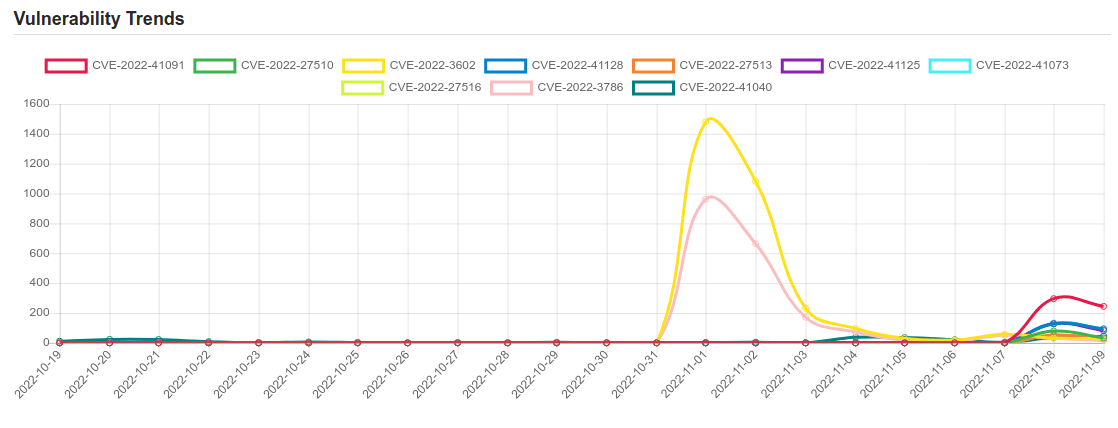Daily Vulnerability Trends: Thu Nov 10 2022

| CVE NAME | CVE Description |
| CVE-2022-31686 | VMware Workspace ONE Assist prior to 22.10 contains a Broken Authentication Method vulnerability. A malicious actor with network access to Workspace ONE Assist may be able to obtain administrative access without the need to authenticate to the application. |
| CVE-2022-31687 | VMware Workspace ONE Assist prior to 22.10 contains a Broken Access Control vulnerability. A malicious actor with network access to Workspace ONE Assist may be able to obtain administrative access without the need to authenticate to the application. |
| CVE-2022-41082 | Microsoft Exchange Server Remote Code Execution Vulnerability. |
| CVE-2022-39328 | Grafana is an open-source platform for monitoring and observability. Versions starting with 9.2.0 and less than 9.2.4 contain a race condition in the authentication middlewares logic which may allow an unauthenticated user to query an administration endpoint under heavy load. This issue is patched in 9.2.4. There are no known workarounds. |
| CVE-2022-40619 | No description provided |
| CVE-2022-31692 | Spring Security, versions 5.7 prior to 5.7.5 and 5.6 prior to 5.6.9 could be susceptible to authorization rules bypass via forward or include dispatcher types. Specifically, an application is vulnerable when all of the following are true: The application expects that Spring Security applies security to forward and include dispatcher types. The application uses the AuthorizationFilter either manually or via the authorizeHttpRequests() method. The application configures the FilterChainProxy to apply to forward and/or include requests (e.g. spring.security.filter.dispatcher-types = request, error, async, forward, include). The application may forward or include the request to a higher privilege-secured endpoint.The application configures Spring Security to apply to every dispatcher type via authorizeHttpRequests().shouldFilterAllDispatcherTypes(true) |
| CVE-2022-34918 | An issue was discovered in the Linux kernel through 5.18.9. A type confusion bug in nft_set_elem_init (leading to a buffer overflow) could be used by a local attacker to escalate privileges, a different vulnerability than CVE-2022-32250. (The attacker can obtain root access, but must start with an unprivileged user namespace to obtain CAP_NET_ADMIN access.) This can be fixed in nft_setelem_parse_data in net/netfilter/nf_tables_api.c. |
| CVE-2022-41091 | Windows Mark of the Web Security Feature Bypass Vulnerability. This CVE ID is unique from CVE-2022-41049. |
| CVE-2022-27510 | Unauthorized access to Gateway user capabilities |
| CVE-2022-3602 | A buffer overrun can be triggered in X.509 certificate verification, specifically in name constraint checking. Note that this occurs after certificate chain signature verification and requires either a CA to have signed the malicious certificate or for the application to continue certificate verification despite failure to construct a path to a trusted issuer. An attacker can craft a malicious email address to overflow four attacker-controlled bytes on the stack. This buffer overflow could result in a crash (causing a denial of service) or potentially remote code execution. Many platforms implement stack overflow protections which would mitigate against the risk of remote code execution. The risk may be further mitigated based on stack layout for any given platform/compiler. Pre-announcements of CVE-2022-3602 described this issue as CRITICAL. Further analysis based on some of the mitigating factors described above have led this to be downgraded to HIGH. Users are still encouraged to upgrade to a new version as soon as possible. In a TLS client, this can be triggered by connecting to a malicious server. In a TLS server, this can be triggered if the server requests client authentication and a malicious client connects. Fixed in OpenSSL 3.0.7 (Affected 3.0.0,3.0.1,3.0.2,3.0.3,3.0.4,3.0.5,3.0.6). |
| CVE-2022-27513 | Remote desktop takeover via phishing |
| CVE-2022-41125 | Windows CNG Key Isolation Service Elevation of Privilege Vulnerability. |
| CVE-2022-41073 | Windows Print Spooler Elevation of Privilege Vulnerability. |
| CVE-2022-27516 | User login brute force protection functionality bypass |
| CVE-2022-3786 | A buffer overrun can be triggered in X.509 certificate verification, specifically in name constraint checking. Note that this occurs after certificate chain signature verification and requires either a CA to have signed a malicious certificate or for an application to continue certificate verification despite failure to construct a path to a trusted issuer. An attacker can craft a malicious email address in a certificate to overflow an arbitrary number of bytes containing the `.’ character (decimal 46) on the stack. This buffer overflow could result in a crash (causing a denial of service). In a TLS client, this can be triggered by connecting to a malicious server. In a TLS server, this can be triggered if the server requests client authentication and a malicious client connects. |
| CVE-2022-41040 | Microsoft Exchange Server Elevation of Privilege Vulnerability. |
| CVE-2022-41049 | Windows Mark of the Web Security Feature Bypass Vulnerability. This CVE ID is unique from CVE-2022-41091. |
| CVE-2022-31685 | VMware Workspace ONE Assist prior to 22.10 contains an Authentication Bypass vulnerability. A malicious actor with network access to Workspace ONE Assist may be able to obtain administrative access without the need to authenticate to the application. |
| CVE-2022-40684 | An authentication bypass using an alternate path or channel [CWE-288] in Fortinet FortiOS version 7.2.0 through 7.2.1 and 7.0.0 through 7.0.6, FortiProxy version 7.2.0 and version 7.0.0 through 7.0.6 and FortiSwitchManager version 7.2.0 and 7.0.0 allows an unauthenticated atttacker to perform operations on the administrative interface via specially crafted HTTP or HTTPS requests. |
| CVE-2022-41128 | Microsoft Windows Scripting Languages code execution | CVE-2022-41128 |
A considerable amount of time and effort goes into maintaining this website, creating backend automation and creating new features and content for you to make actionable intelligence decisions. Everyone that supports the site helps enable new functionality.
If you like the site, please support us on Patreon using the button below

To keep up to date follow us on the below channels.




![Cobalt Strike Beacon Detected - 101[.]200[.]128[.]141:8888 6 Cobalt-Strike](https://www.redpacketsecurity.com/wp-content/uploads/2021/11/Cobalt-Strike-300x201.jpg)